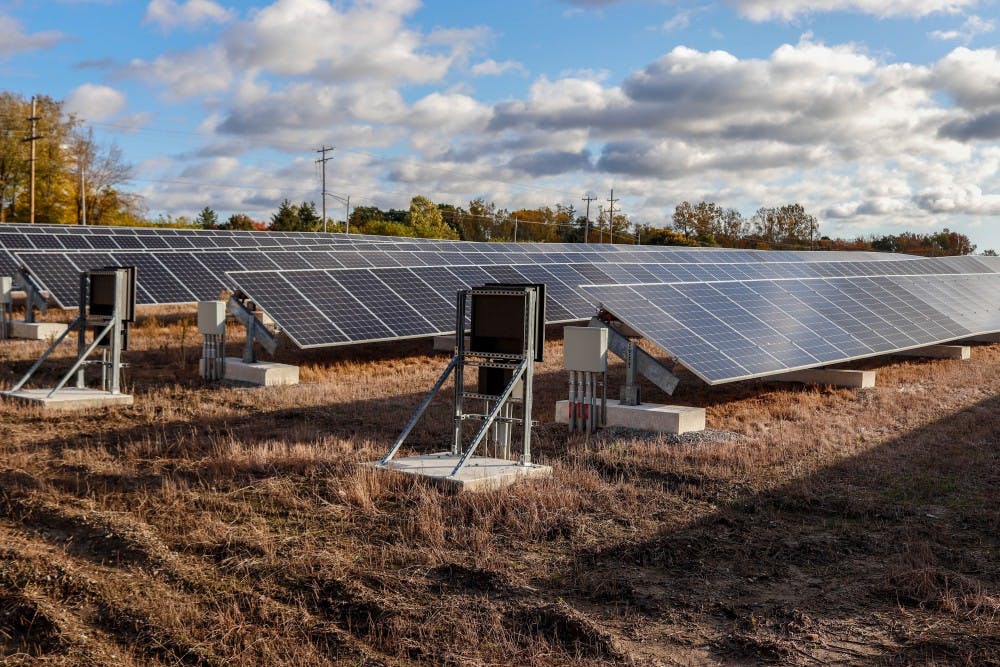Michigan State Sustainability hosted Michigan’s “Solve Climate by 2030” webinar Tuesday as a part of a national teach-in where each state broadcasted actions to address climate change at local levels.
MSU Sustainability Director Amy Butler and Sustainability Program Coordinator Laura Young moderated the hour-long session, which focused on MSU’s sustainability plan, transportation, and climate change and equity.
MSU's climate policies
MSU Associate Vice President for Administration Wolfgang Bauer began his presentation with the idea that energy is money. In order to convert away from fossil power electricity, there has to be money involved, Bauer said. When energy conservation is properly done, it pays for itself.
MSU’s Energy Transition Plan was approved by the Board of Trustees in April 2012. The plan sees MSU increasing to 40% campus renewable energy and 65% greenhouse emission reduction by 2030, Bauer said.
Bauer said that this goal is not as aggressive as the overall goal for 2030, but the progress can be seen through other university initiatives including the recycling center, organic waste composting facility, geo-thermal array, anaerobic digester, solar arrays and, most importantly, demand reduction.
One of the ways MSU has been progressing in its solar panel usage, Bauer said, is that they are becoming much more efficient and cheaper. Michigan property tax, however, means an effective cost added of about 20%.
With a power purchase agreement, investors are able to provide capital for us to purchase these arrays and then earn returns.
MSU has covered 5,000 parking spots on 45 acres of parking lots with solar panels, Bauer said. With them, over a year the university is able to get about 15,000 megawatts of solar energy.
“This power purchase agreement makes electricity prices very predictable for us,” Bauer said. “It will not change for the next 25 years and we, MSU, will save $10 million in electricity costs.”
Climate change and equity
Michigan Department of Environment Great Lakes and Energy Environmental Justice Public Advocate Regina Strong focused on who is important in the path to sustainability.
Strong said the fair involvement of all people in environmental laws, regulations and policies was crucial for environmental justice.
“One of the things that stood out in that work was communities that were overburdened by a lot of the industrial pollution,” Strong said.
In order to achieve this justice, there must be fair treatment of all people, and the public must be involved in government decision-making, she said.
People who live close to industry are often deeply affected, Strong said, and these are the people that need to have this justice.
“You don’t just leave differences as a point of contention,” Strong said. “But actually you include folks from varying perspectives into the conversation.”
She differentiated diversity and inclusion, saying diversity points to difference, but inclusion describes needing to incorporate these differences on a shared platform.
Similarly, Strong described equality and equity. She said equality is treating people the same, while equity accounts for how the past has shaped social advantage and disadvantage.
Transportation's future
Support student media!
Please consider donating to The State News and help fund the future of journalism.
Ecology Center Climate & Energy Program Director Charles Griffith focused on the role of transportation in reducing climate emissions.
“The transportation sector ... has now become the largest sector in terms of carbon emissions,” Griffith said. “That’s partly because we’ve had some pretty good progress in the power sector.”
It is critical to create the decarbonization pathway for the transportation sector to replace oil with low-carbon energy sources, he said. This is most easily achieved by electrifying transportation.
Griffith said soon these electrical vehicles could be about the same price as a conventional vehicle.
As automakers are investing more money in development, the variety of electric cars could go from a few models to almost every car you could want in an electrical version by 2030, Griffith said.
Griffith said some policies that would be needed for electric vehicles include a strong federal fuel economy and vehicle greenhouse gas standards, support of state clean car standards, extending federal tax credits for electric vehicle purchases, additional state incentives or tax credits and eliminating unfair electric vehicle registration fees.
In regards to the federal tax credits, Griffith said, for many big auto companies their credits expired after passing the 200,000 vehicle limit. Extending the limit would allow more cars to be available for purchase.
Discussion
Share and discuss “MSU hosts Michigan's 'Solve Climate by 2030' virtual teach-in” on social media.








